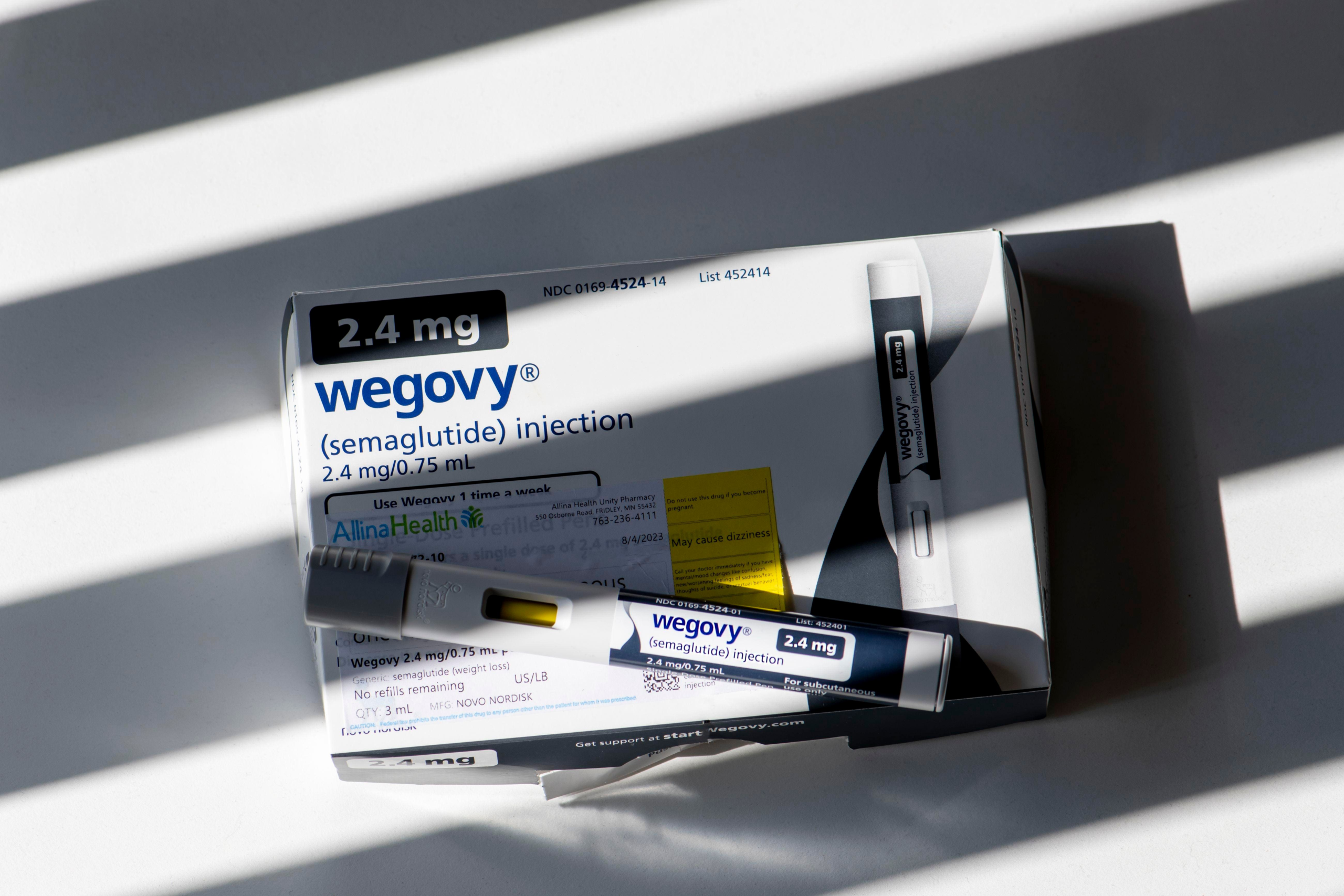Still life of Wegovy an injectable prescription weight loss medicine that has helped people with … [+]
Popular weight loss drugs like Wegovy and Ozempic that contain the common active ingredient semaglutide continue to be in high demand in America.
These class of drugs are glucagon-like-peptide-1 agonists, and mimic and enhance the effect of the naturally occurring hormone GLP-1 in the body. The drugs work by stimulating the release of insulin from the pancreas which decreases blood sugar levels. Ozempic, which is FDA approved to treat type II diabetes, works in this way to help patients control their high blood sugar levels. GLP-1 agonists can also secondarily allow people to lose weight since they delay emptying of food from the stomach and work to control hunger and craving centers in the brain. Wegovy is the FDA approved GLP-1 agonist that is specifically approved to treat obesity.
These drugs have clear benefits and are extremely effective at treating obesity. Research has shown that patients who took Wegovy for four years lost and sustained 10% of their bodyweight while remaining on the drug. The effect of these drugs doesn’t stop at simply shedding pounds. Patients who took semaglutide had a 20% lower risk of heart attack, stroke and death from cardiovascular disease after three years of treatment, according to the SELECT trial. Importantly, patients that took the drug received the cardiovascular benefits regardless of their starting weight or how much weight they lost.
Semaglutide can also protect the kidney in diabetics. Those who received weekly injections of semaglutide were 24% less likely to have major kidney disease events including kidney failure when compared to those who got placebos, according to reports of a phase IIIb trial described in Nature.
These drugs could be game-changers in combatting the obesity epidemic in America. Nearly 40% of American adults are obese, and another 31.6% are overweight, according to data from Food Research and Action Center. These drugs will also profoundly affect heart health, as cardiovascular disease remains the No. 1 cause of death in the world.
Despite the overwhelming benefits of these drugs, there are risks and concerns with taking GLP-1 agonists. Like all drugs, they have side effects, some mild and others serious. The drugs are generally well tolerated and most patients experience mild side effects that include nausea, vomiting, constipation or diarrhea. More serious side effects include gallbladder problems, inflammation of the pancreas, changes in vision and even the development of a type of thyroid cancer.
As the popularity of these drugs soar in American culture coupled with rising obesity rates, the potential for misuse and overuse will become a major public health concern. Individuals may seek the drug as a quick fix to being overweight, without addressing underlying lifestyle factors that are contributing to obesity. In theory, people could lose significant amounts of weight on the drug while still eating unhealthy or not participating in regular exercise. Obesity is a complex, chronic disease that requires a multifaceted approach to therapy, which includes lifestyle modifications such as diet and exercise in addition to drug therapy when appropriate. The goal for obesity therapy should be overall improvement in health, and not just decreasing the number on the weight machine.
Drugs like Ozempic and Wegovy are also meant to be used for the long term, as they are treating chronic diseases. With celebrities touting the efficacy of these drugs in short-term weight loss, many may seek these drugs just to shed pounds before important events like weddings. This type of behavior undermines the goals of these medications, which is for sustained weight loss in an attempt to curb a chronic disease. Those who take the drug in the short-term will likely regain the weight they lose after discontinuing the drug. The use of semaglutide should be guided by medical necessity as opposed to societal expectations to conform to certain body standards.
Finally, these drugs are not cheap. The monthly cost of Wegovy without insurance can be more than $1,300, according to Singlecare. Recently, Medicare announced that health plans operating in the Medicare D (outpatient) program could provide limited access to Wegovy for patients who are overweight or obese and have preexisting heart disease. Despite limited access to anti-obesity drugs through Medicare, the high cost of these drugs could exacerbate health disparities, as obesity disproportionately affects low-income Americans who may not be able to afford these drugs.
There is no doubt that GLP-1 drugs could change the face of obesity in America and have profound effects on health that we are only beginning to discover. Despite all the potential glamor, we must remember to use the drugs judiciously in the spirit of improving overall health.
One Community. Many Voices. Create a free account to share your thoughts.
Our community is about connecting people through open and thoughtful conversations. We want our readers to share their views and exchange ideas and facts in a safe space.
In order to do so, please follow the posting rules in our site’s Terms of Service. We’ve summarized some of those key rules below. Simply put, keep it civil.
Your post will be rejected if we notice that it seems to contain:
User accounts will be blocked if we notice or believe that users are engaged in:
So, how can you be a power user?
Thanks for reading our community guidelines. Please read the full list of posting rules found in our site’s Terms of Service.


